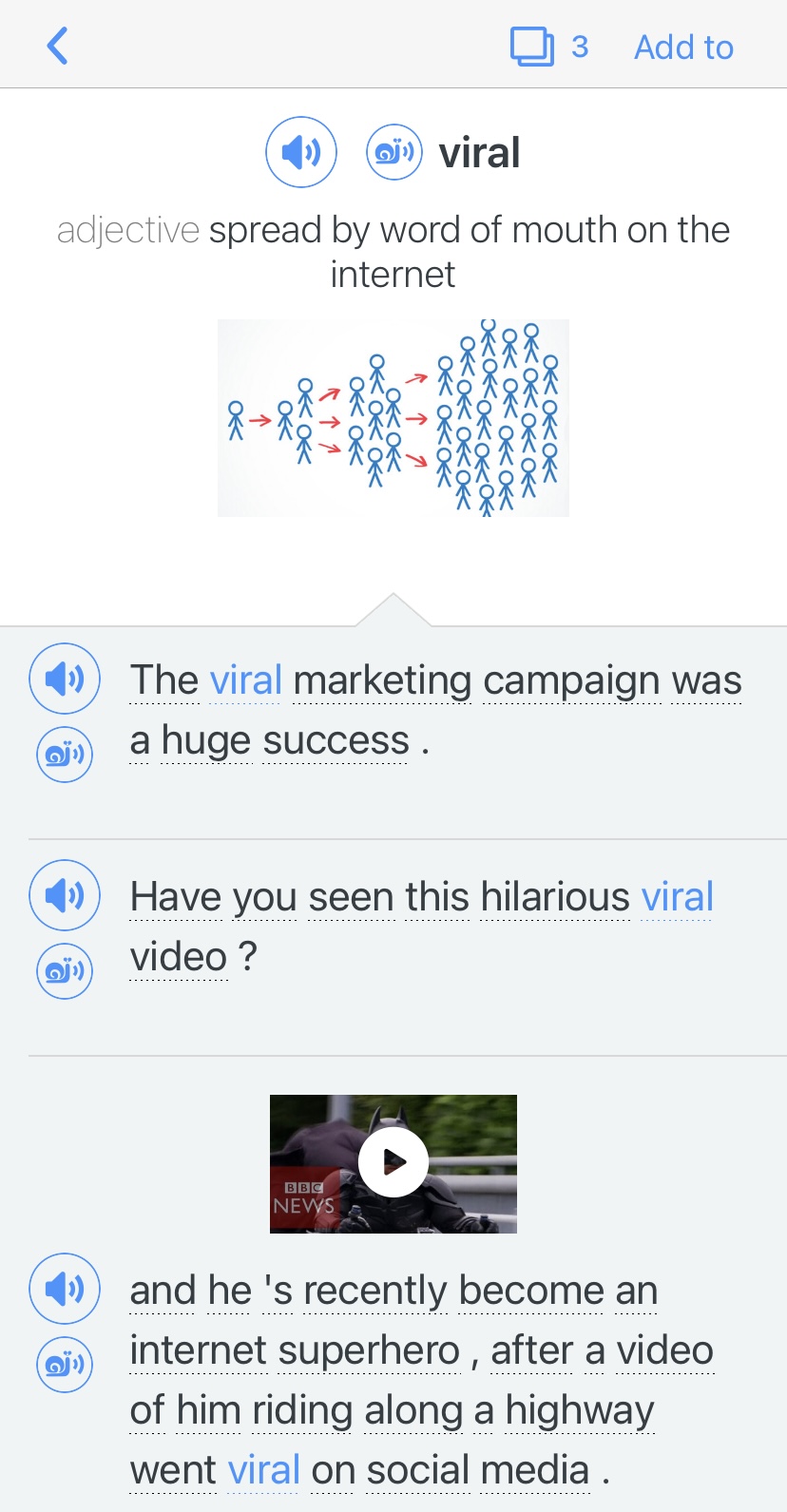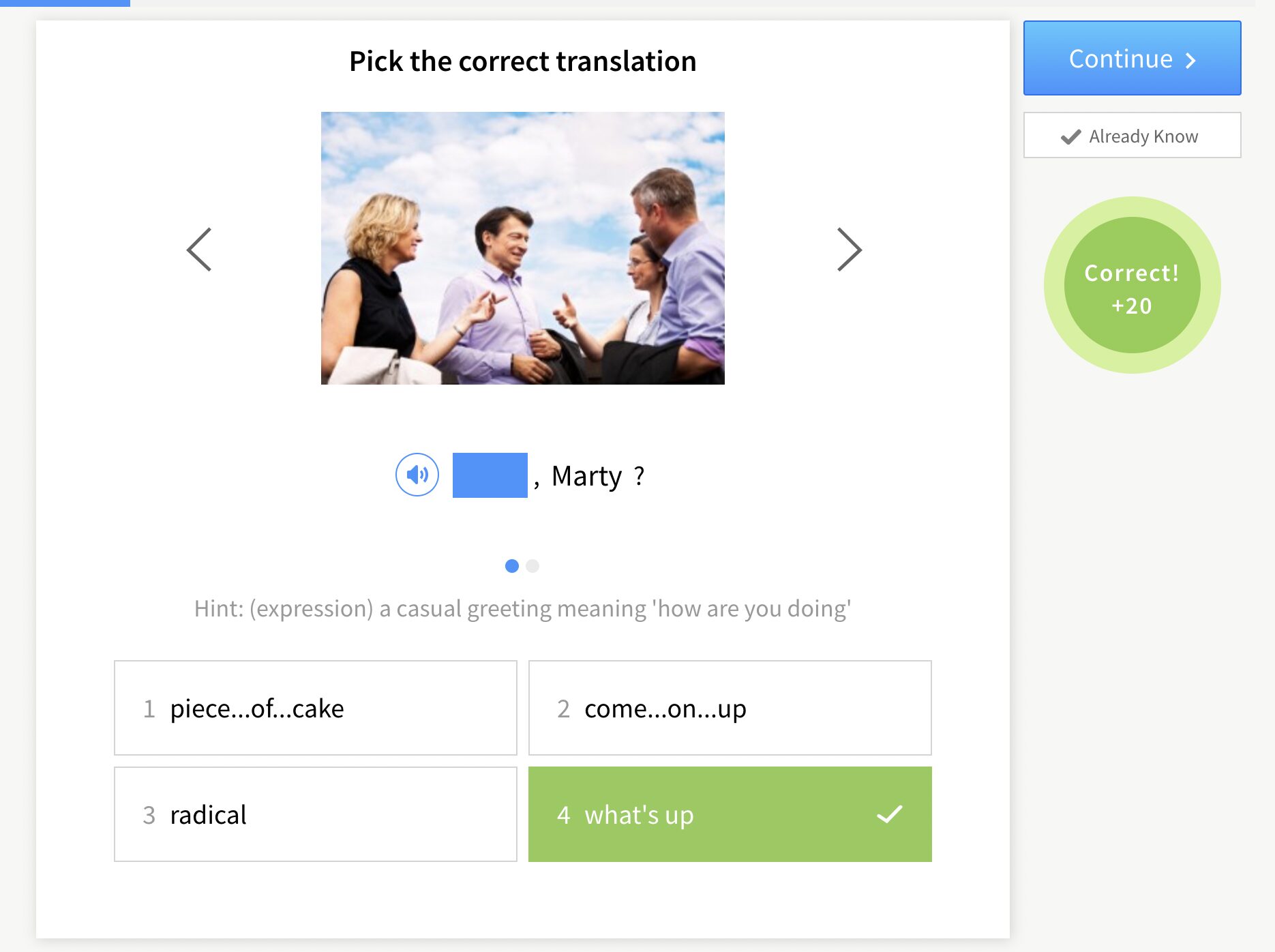Contents
- 1. Think in English
- 2. Learn from English Media on FluentU
- 3. Pay Attention to Stressed Sounds
- 4. Talk to Yourself
- 5. Master English Registers
- 6. Use a Mirror
- 7. Focus on English Fluency, Not Grammar
- 8. Try English Tongue Twisters
- 9. Listen and Repeat
- 10. Sing Along to English Songs
- 11. Learn Word Forms with New Words
- 12. Learn Phrases, Not Words
- 13. Learn Your Most Common Sayings
- 14. Prepare for Specific Situations
- 15. Learn Exceptions and Use Them
- 16. Learn the IPA Alphabet
- 17. Take Online Speaking Courses
- 18. Be Creative
- 19. Narrate Your World
- 20. Read in English
- 21. Relax!
- 22. Tell a Story from Your Language in English
- 23. Explore English Dialects
- 24. Talk to Your Smart Device
- 25. Use Apps with English Audio
- 26. Watch and Copy English Speakers
- 27. Keep Notes on Your Mistakes
- And One More Thing…
27 Ways to Improve Your Spoken English without a Speaking Partner

Learning spoken English can feel like an uphill climb, especially when you’re practicing alone. Fortunately, there are a lot of practical strategies to build fluency and confidence in your speech—even without a partner.
From thinking in English to testing tongue twisters, we’ll cover innovative ways to improve your skills all by yourself. We’ve got some tips in this video from our YouTube channel but you’ll find more in the post below.
1. Think in English
Sometimes, the difficult thing about English speaking isn’t the language itself, but how you think about it.
If you think in your native language and then try to speak English, you’ll always have to translate between languages. Translating isn’t an easy thing to do! Even people fluent in two or more languages have trouble switching between languages.
The solution is to think in English.
You can do this anywhere, anytime.
Try to use English when you’re thinking about your day, or when you’re trying to decide what food to order.
Even try to use an English-to-English dictionary to look up words. That way, you never have to use your native language and translate words.
You’ll notice that when you think in English, it’s easier for you to speak in English, too.
2. Learn from English Media on FluentU
English-language movies, TV shows and other native content are helpful for language learners. These types of videos help you learn about the natural flow of conversations, pronunciation and everyday vocabulary.
But watching English-language media can also be quite difficult.
Native speakers talk fast with many different accents. You also have to pause videos and check a dictionary every time you hear a word you don’t understand.
FluentU helps you learn from and enjoy music videos, movie trailers and other English language clips. It’s a language learning website, iOS and Android app, with fun videos for every level and learning tools to help you understand everything the native speakers are saying.
For example, the media clips have interactive subtitles. That means you can click on any word in the subtitles—this will pause the video and show you the word’s definition, pronunciation, image and other videos that include that word.
You can also add that word to your personal flashcards so you can practice later. These flashcards also have the same learning aids as the interactive subtitles.
There’s a short quiz after each video that will ask you questions about vocabulary and grammar from the clip. You can also speak and record your answers to test your pronunciation.
3. Pay Attention to Stressed Sounds
English uses stresses in words and sentences. That means when you speak English you’ll need to stress, or emphasize, certain words and syllables (sounds) to give them different meanings.
Listen to where native speakers place the emphasis when they speak. Try to repeat it the same way to improve English stress in your own speech.
This won’t only help you speak English well, it might even reduce misunderstandings.
Sometimes, placing the stress on the wrong syllable completely changes the word. The word ADdress, for instance, isn’t the same as the word adDRESS. ADdress refers to a physical location where someone lives, and adDRESS means to formally speak to a group of people.
Listen to how both of these words are pronounced right after each other on Forvo. Can you tell the difference?
Learn to hear the difference!
4. Talk to Yourself
Whenever you’re at home (or alone somewhere else) you can improve your English speaking with your favorite person: yourself.
If you’re already thinking in English, try speaking your thoughts out loud.
Read out loud, too.
Practice is practice, and even if you don’t have anyone to correct your mistakes, just the act of speaking out loud will help you become more comfortable speaking English.
5. Master English Registers
In order to communicate effectively in English, you need to know the different English registers that exist.
A register is a different set of words and phrases that you use depending on the situation you find yourself in.
For example, the way you speak English to a friend is different from the way you would speak to a child, and that would be different from the English you would speak in a business meeting.
To improve your speaking, you need to move effortlessly between all registers of English. This means you should know what register to use with your friends, at work and with people you meet for the first time.
6. Use a Mirror
Whenever you can, take a few minutes out of your day to stand in front of the mirror and speak. Choose a topic, set a timer for two or three minutes and just talk.
The point of this exercise is to watch your mouth, face and body language as you speak. It also makes you feel like you’re talking to someone, so you can pretend you’re having a discussion with a study buddy.
Talk for the full two or three minutes. Don’t stop!
If you get stuck on a word you don’t know, try expressing your idea in a different way. You can always look up how to say that word after the two to three minutes end.
This will definitely help you find out what kinds of words or sentences you have trouble with.
7. Focus on English Fluency, Not Grammar
When you speak in English, how often do you stop?
The more you stop, the less confident you sound and the less comfortable you become. Try the mirror exercise above, but challenge yourself to speak without stopping or stammering (taking pauses between your words) the entire time.
This might mean that your sentences won’t be grammatically perfect, and that’s okay!
If you focus on speaking fluently instead of correctly, you’ll still be understood and you’ll sound better. You can fill in the correct grammar and word rules as you learn them better.
8. Try English Tongue Twisters
Tongue twisters are series of words that are difficult to say quickly. One example is: “The thirty-three thieves thought that they thrilled the throne throughout Thursday.”
Try saying this a few times! It’s not easy.
Word games like this will help you find the right placement for your mouth and tongue, and can even help your pronunciation. You can find a list of great tongue twisters here.
9. Listen and Repeat
Following along with TV shows, YouTube videos or other natural English speech to practice sounding natural, too!
Find a short clip that you like, or that uses words that you would say in real life, then repeat it line by line.
Try to match the tone, speed and even the accent (if you can). It doesn’t matter if you miss a few words, the important thing is to keep talking. Try to sound just like the native speakers.
10. Sing Along to English Songs
Singing along to your favorite English songs will help you become more fluent. This is a tried-and-true language learning method that’s backed by science.
Once you can sing along to pop singers like Taylor Swift and Jason Mraz, you can test your skills with something a bit more difficult: rap!
Rap is a great way to practice English because often the words are spoken like regular sentences.
However, the rapper uses a stronger rhythm and faster speed. Some of the words might not make sense, but if you can keep up with the rapper then you’re on your way to becoming fluent!
11. Learn Word Forms with New Words
Some practice comes before you even open your mouth.
Make speaking easier by learning the different forms of any words you learn. You should do this when you’re learning new vocabulary.
For example, if you just learned the word write, you should also learn some other forms like wrote and written.
Knowing the correct way to use a word in any kind of sentence is important. This knowledge will help you while speaking. You won’t have to stop and think of different words—you’ll know exactly when you need to use that word while speaking.
12. Learn Phrases, Not Words
An even better idea to improve English is to learn word phrases, not just words.
You might be using correct grammar and vocabulary, but it’s still not how a native speaker would say it.
For example, you can say “how do you feel today?” but a native speaker might say “how’re you doing?” or “what’s up?” instead. Phrases and expressions can be helpful for sounding more natural when you speak.
13. Learn Your Most Common Sayings
Take some time to really notice how you speak in your native language.
What words and phrases do you use the most often?
Learn how to say your most commonly used phrases and words in English. Knowing them in English will help you speak as well in English as you do in your native language.
To get you started, one of the most basic and useful phrases in English and arguably any language is “I’m sorry.”
“I’m sorry” has lots of different uses and can help with daily interactions as well as more complicated and emotional situations.
The video below shows how important learning basic native expressions can be and how they change depending on the context.
14. Prepare for Specific Situations
Are you learning to speak English for a specific reason?
For example, are you learning English so you can make friends in America? Then you’d need to learn the American English dialect.
What if you’re learning English so you can get a job in an English-speaking company? In that case, practice English that will help you in an interview.
Before you go to a place where you have to speak English, you can practice what you might have to say.
If you’re preparing to go to a restaurant, which phrases do you need to know? Answer the questions a waiter might ask you. Try talking about food and menus.
You’ll feel more confident if you’re prepared!
15. Learn Exceptions and Use Them
If you’ve been learning English for a while, you probably know that it is full of exceptions to its rules.
A lot of learners will get angry at this, but here’s what you can do: Use those exceptions to speak English better!
It would be impossible to learn all the exceptions of the language, but you can focus on groups of exceptions and learn one or two groups every week.
The next step in this tip is to use the exceptions you’ve learned. In order to do this, you can use any other tip on this list. Just take the exceptions and use them as much as you can in your conversations, and soon they’ll be so common for you that you’ll just use them naturally.
Some examples of exceptions or irregularities you can learn are:
- irregular plurals
- irregular verbs
- exceptions in pronunciation
- “i before e except after c” exceptions
- and so on.
Don’t miss “The Chaos of English Pronunciation” poem if you want to see hundreds of pronunciation exceptions in a couple of minutes. Would you be able to learn it by heart? Now, that’s a challenge!
16. Learn the IPA Alphabet
A great tool you can use if you want to pronounce “The Chaos” poem perfectly is the International Phonetic Association (IPA) alphabet or, the IPA chart.
The IPA alphabet is a chart where all the sounds that exist in all the languages in the world are included!
Of course, you only have to learn the sounds of English, but once you do that, you’ll be able to pronounce without hesitation every phonetic transcription you see.
Learning the IPA alphabet can seem very difficult, but it’s totally worth it. Next time you see the transcription [trænˈskrɪpʃən], you’ll know how to pronounce that word perfectly.
17. Take Online Speaking Courses
You may not have a speaking partner, but guess what you have? Free online speaking courses!
Learning online is becoming more and more popular. Besides, the offer is so huge that many times the price is actually free.
There are thousands of courses online that can help you improve your English speaking skills. I’ve selected three that I’m sure will help you with that:
- Speaking and Writing English Effectively. Boost your writing and speaking skills thanks to the techniques included in this amazing course.
- Speak English Professionally. If you need to improve your conversation skills for work, this is the perfect course for you.
- English for Doing Business in Asia—Speaking. Many of us don’t need to do business in Asia, but Asia is just the setting. This course focuses on speaking and business English, and its main goal is to teach you how to deliver the perfect oral presentation.
18. Be Creative
Improving our English speaking skills can be fun if we have a little bit of creativity.
Whatever “fun” means to you, use it to your advantage and include English in it.
For example, try sitting on your couch and looking around.
Find an interesting object and try to describe it in English.
If you’re just starting, you might use easy vocabulary and short sentences. But the better you get, the better you’ll get at this little exercise!
Something else you can try is creative journaling in English. A lot of people think that journaling is the same as keeping a diary, but it’s so much more! The sky’s the limit—as long as the sky is in English.
Finally, try to make your own life difficult. No, I’m not crazy.
Have you ever had a situation where you were trying to say something in English but you got stuck because you couldn’t remember a word? Do that on purpose!
Try to talk about something without using specific words. It’s like a real-life game of “Taboo,” but you make the rules.
In other words, be as creative as you want, and use English all the way.
19. Narrate Your World
Something similar to describing objects is to describe what you see when you’re outside.
If you’re walking to the grocery store or commuting to work, try to describe what you see. It’ll be like having a guided tour of your own surroundings, but the narrator is you!
You don’t have to talk out loud if you don’t want to or you can’t. Do it in your head, instead, and listen to your inner voice.
The more you practice this, the easier it’ll be to have a real conversation with other people. It’ll also help you get into the habit of thinking in English!
20. Read in English
Do you want to improve your speaking skills? Then you have to start reading, as well!
It’s impossible to improve one area of a language (like speaking) if you don’t practice and improve other areas, as well.
Reading helps you to improve your speaking skills because it makes your brain work. When you read, you probably listen to your head or inner voice pronouncing the words.
Besides that, you’re able to learn new words in context that you can use later in your conversations.
Finally, when you read (newspapers, books, graded readers, poetry…), you’ll mostly have contact with correct, well-structured English.
The more you read, the faster your brain will start recognizing patterns and groups of words that normally go together. When those patterns are already in your head, you can use them in your conversations without hesitation.
21. Relax!
You can be your best helper or your worst enemy when learning to speak fluently! I know it’s hard, but you should try not to worry about how you sound when you speak. Just relax!
If you get stuck or confused, just take a big breath and start over. Speak slower if you have to. Take time to pause and think about your next sentence.
Do whatever it takes to become more comfortable with speaking English.
22. Tell a Story from Your Language in English
Here’s a fun way to test how well your spoken English has developed: Choose a story that you know really well and tell it in English.
Remember to think in English as you’re telling your story. Focus on speaking fluently instead of correctly. Say every sentence out loud to yourself.
23. Explore English Dialects
English comes in all kinds of shapes and sizes. Dialects are the different ways in which a language is spoken based on who the speaker is and where they come from.
The United States alone has over 20 English-language dialects, including Southern English, New England English and Western English. Many natives can even guess where a person comes from based on the dialect they use!
There are also English dialects from other countries, such as Canada and the United Kingdom. One of the most popular is the British English dialect, which a lot of people find very fancy and appealing!
Once you become comfortable with standardized English, you can branch out and explore different dialects.
It can make speaking practice quite fun as you learn how the same words are pronounced across different places. Also, learning dialects can teach you different phrases that mean the same thing.
If you want to learn more about different dialects, you can look up videos online (particularly on YouTube) to hear native speakers talking in their unique dialects. You can also find informational videos made by English coaches, who can teach you how to speak in a certain dialect.
Movies are also a great way to listen to dialects. English language films from different countries can show you how a dialect sounds and how it’s used. Plus, you might get some new additions to your “favorite movies” list!
24. Talk to Your Smart Device
Most smartphones and devices let you speak into their microphones so that you can do a lot of things with just your voice, instead of using your fingers. You may have used this to tell Siri or Cortana to do something, or to speak out a message instead of typing it with the keyboard.
These abilities can work fantastically for your speaking practice.
After you switch your device’s language settings to English, you can test how well your spoken English is understood by the device.
The device will be very honest and will show you what words it thinks you’ve said.
From there, you can maybe see if you need to work on anything, whether it’s your pronunciation, grammar or choice of words.
Of course, sometimes the device won’t work at its best, so it won’t always be your fault if what you say isn’t picked up correctly.
25. Use Apps with English Audio
Apps are convenient, fun and interactive. That’s why they’re perfect for on-the-go English studies!
You can easily find apps that let you practice your English speaking skills. They were built to help learners to work on their conversation practice even when they don’t have a speaking buddy.
With these kinds of apps, you can learn a lot of vocabulary and hear audio pronunciations of words and phrases—some even come with review quizzes and a recording tool that can help you track your improvements!
You can also use other kinds of English language apps.
An English dictionary or translation app can give you definitions of words, but they almost always come with short audio clips of how they’re said.
An English flashcard app lets you easily memorize vocabulary with card sets, which can also include audio pronunciations.
Here are some great examples of apps you can use for speaking practice:
- FluentU: iOS | Android
- ELSA Speak: iOS | Android
- Translate Now: iOS | Android
- Say It: iOS | Android
- Quizlet: iOS | Android
And there are many more!
If you’re the kind of person who always has a smart device nearby, then you should fill it up with helpful English learning apps. Whenever you’re bored or have some extra time, you can just open an app and instantly start some English pronunciation practice!
26. Watch and Copy English Speakers
When we were younger, we used to copy what other people said all the time, usually to annoy them. But this practice, called imitation or mimicry, is actually a key method in foreign language learning!
Whenever you watch something that shows the English speakers, try to copy what they say either after or while they talk.
Do your best to match how they say their words. You can also see how their lips are moving to improve your pronunciation.
You don’t only have to do this when watching videos! If you happen to be near people who are speaking English, you can try to repeat useful pieces of what they say in your head or quietly under your breath.
27. Keep Notes on Your Mistakes
Whenever you make mistakes in your spoken English, don’t be embarrassed!
Instead, write down or remember the mistake, whether it’s your pronunciation, grammar or word choice.
Figure out what went wrong and then find any answers you need to fix and understand your errors.
Many of the mistakes you make are likely to be very understandable or common for non-native speakers, so you should never hide from them. Analyzing mistakes is one of the best practices any learner can do so that they can truly improve their skills with confidence.
Even if you have nobody to talk to in English, you can still build confidence and master fluency on your own time.
In some ways, practicing speaking is even easier by yourself! Now you know exactly how to improve spoken English by yourself and should feel confident doing so!
Download: This blog post is available as a convenient and portable PDF that you can take anywhere. Click here to get a copy. (Download)
And One More Thing…
If you’re like me and prefer learning English on your own time, from the comfort of your smart device, I’ve got something you’ll love.
With FluentU’s Chrome Extension, you can turn any YouTube or Netflix video with subtitles into an interactive language lesson. That means you can learn from real-world content, just as native English speakers actually speak.
You can even import your favorite YouTube videos into your FluentU account. If you’re not sure where to start, check out our curated library of videos that are handpicked for beginners and intermediate learners, as you can see here:
FluentU brings native English videos within reach. With interactive captions, you can hover over any word to see an image, definition, and pronunciation.
Just click on the word to see other example sentences and videos where the word is used in different contexts. Plus, you can add it to your flashcards! For example, if I tap on the word "viral," this is what pops up:
Want to make sure you really remember what you've learned? We’ve got you covered. Practice and reinforce the vocab from each video with learn mode. Swipe to see more examples of the word you’re learning, and play mini-games with our dynamic flashcards.
The best part? FluentU tracks everything you’re learning and uses that to create a personalized experience just for you. You’ll get extra practice with tricky words and even be reminded when it’s time to review—so nothing slips through the cracks.
Start using the FluentU website on your computer or tablet or, better yet, download our from the App Store or Google Play.
Click here to take advantage of our current sale! (Expires at the end of this month.)



















